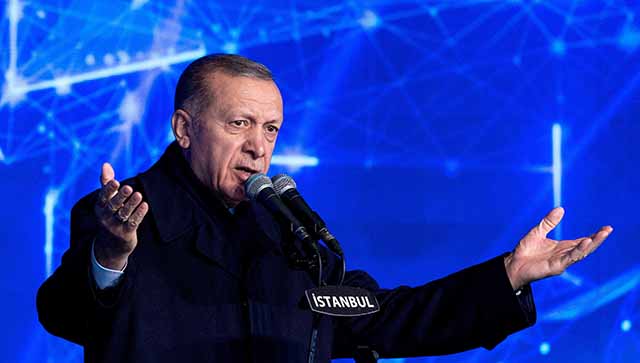In the midst of the Israel-Hamas war, the need for mature statesmanship is paramount. However, Turkish President Recep Tayyip Erdogan seems to have deviated from this approach, opting for provocation over measured diplomacy.
Erdogan’s recent address to the Turkish Parliament revealed a shift in his stance. He directly challenged Israeli Prime Minister Benjamin Netanyahu, questioning Israel’s possession of nuclear weapons and labelling the country a “terror state”. This departure from Erdogan’s earlier, more restrained position begs the question: What prompted this change? “I am calling on (Israeli Prime Minister Benjamin) Netanyahu from here: do you have an atom bomb or not? Do you have it or not? Announce it if you dare. But he can’t. Hey, Israel! You have an atom bomb, a nuclear bomb and you are threatening with this. We know these. No matter whether you own a nuclear bomb, own whatever you own but you are a goner,” said President Erdogan. Israel’s nuclear ambiguity Israel’s alleged possession of nuclear weapons has long been a topic of speculation. While widely believed to have a nuclear arsenal dating back to the 1960s, Israel maintains a policy of neither confirming nor denying its capabilities. The sensitivity surrounding this issue is rooted in the potential to trigger a destabilizing nuclear arms race. Recent events, such as a suggestion by one of Netanyahu’s ministers to use nuclear force against Gaza (promptly suspended), added fuel to the already tense situation. Erdogan’s rhetoric: From mediation to provocation Erdogan’s initial response to the conflict was measured, urging restraint on both sides and offering to mediate a political solution. However, a shift in tone has been evident. Erdogan’s recent rhetoric accuses Israel of being a “terror state” and questions its nuclear capabilities. This shift aligns with Erdogan’s strategy of positioning himself as a prominent Islamic leader. While initially warming up to Israel in past diplomatic engagements, Erdogan’s current provocative stance suggests a recalibration of his approach. At home, Erdogan faces pressure from his predominantly Islamist support base, which strongly favours Palestine. His earlier calls for restraint were met with criticism from within his own circles, prompting a strategic pivot. Internationally, pro-Palestine sentiments during massive marches across Western capitals and unity within the Muslim world made Erdogan’s mediation efforts appear counterproductive. In response, Erdogan seems to have abandoned his earlier stance for a more assertive position. “Hamas is not a terrorist organisation but a liberation group, a group of Mujahadeen that is fighting to protect its soil and its citizens,” said the Turkish president. Erdogan’s high-stakes strategy The provocative comments and shift in tone may indicate two possible scenarios. Erdogan might be exploiting the conflict for political gains domestically, leveraging the widespread support for Palestine within Turkey. Alternatively, he could be positioning himself strategically for the post-war negotiations, aiming for influence in discussions about Gaza’s control, the two-state solution and the fate of Hamas. Despite the inflammatory rhetoric, Erdogan has not severed communication with Israel entirely. The preservation of a hotline to Netanyahu suggests a readiness for various eventualities, although mediating after such provocative comments will undoubtedly pose challenges. Netanyahu’s response, dismissing Erdogan’s comments and asserting that Israel does not need lectures, highlights the strained relations. Erdogan’s calculated strategy, supported by his geopolitical importance to the West, allows him to make provocative statements with relative impunity. “You know, there are forces that support the terrorists, and one of them is President (Recep Tayyip) Erdogan of Turkey, who calls Israel a terrorist state but actually supports the terrorist state of Hamas. He has himself bombed Turkish villages, inside Turkey itself, so we’re not gonna get any lectures from them,” said Prime Minister Netanyahu. However, Erdogan’s economic challenges, with Turkey facing high inflation and a depreciating currency, add a layer of complexity to his high-stakes strategy. While Qatar, another supporter of Hamas, enjoys financial stability, Turkey’s economic constraints may limit Erdogan’s room for maneuver. As the Israel-Hamas conflict continues, Erdogan’s evolving stance raises questions about his true motivations and the potential ramifications of his high-stakes strategy. Whether he seeks political gains at home or aims for a significant role in post-war negotiations, Erdogan’s approach will undoubtedly shape the dynamics of the region in the aftermath of the conflict. Views expressed in the above piece are personal and solely that of the author. They do not necessarily reflect Firstpost’s views. Read all the Latest News , Trending News , Cricket News , Bollywood News , India News and Entertainment News here. Follow us on Facebook, Twitter and Instagram.


)

)
)
)
)
)
)
)
)



